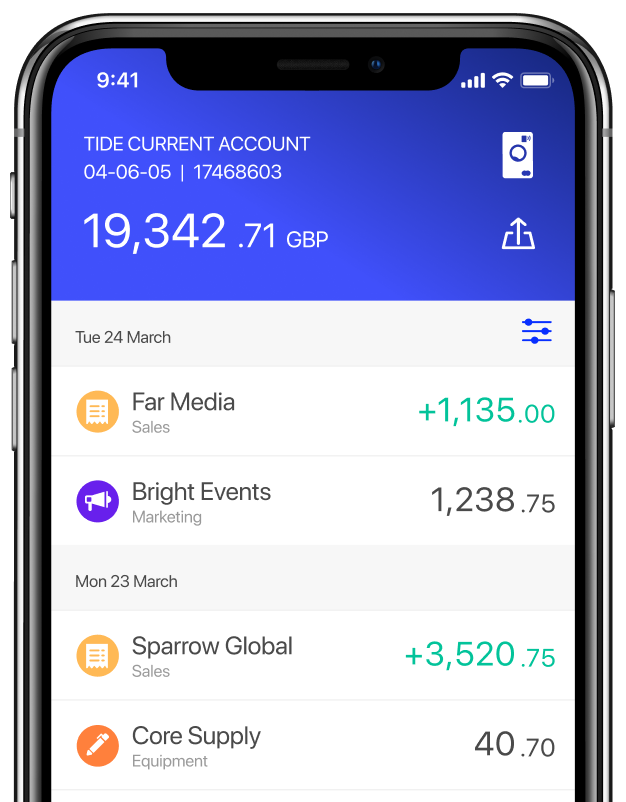
Meet Sarah, Founder of Well Be It (and Tide’s only RAF helicopter pilot)

This is our series about how small business owners are leading or starting up their companies during the coronavirus crisis. To share your story, message us: hello@tide.co, Facebook or Twitter.
At Tide, hundreds of our members are life coaches, teach yoga and/or meditation, or offer other wellbeing services. These industries continue to grow, as individuals and businesses invest more in their physical and mental health.
For successful practitioners, it can be rewarding both emotionally and financially: the global fitness and mind-body industry is currently valued at £444 billion, with the workplace wellness industry worth more than £31 billion (source: Global Wellness Institute).
During the coronavirus crisis, many wellness practitioners have adapted to working online. For some, the challenges of this year have prompted them to reassess their own work/life and make the jump to starting their own business.

Founder of Well Be It
Sarah Furness is a Tide member who’s started up her own wellbeing company, Well Be It. Many Tide members start up their own business alongside a full-time job – but we believe she’s the only RAF helicopter pilot we have on our books!
We asked Sarah about starting her company during the coronavirus crisis, how she balances the demands of two jobs, and her plans for the future.
Hello Sarah! Congratulations on starting your company in March this year! What does Well Be It do?
We offer coaching that helps exceptional people use their brains as a force for good. It’s easy to assume that resilience is instinctive. The truth is that at school, we used our brains to learn but we weren’t taught how to use our brains to increase our performance, resilience and happiness. As a result, many people live in conflict with their own minds, often without even realising it.
Our workshops are bespoke, engaging participants fully throughout and focusing on getting those ‘aha!’ moments. No hippie trousers, no cowbells, no sitting in a field of daisies meditating for five hours. It’s no-nonsense coaching for busy high-functioning people.
What motivated you to start your own company?
I’ve spent my life surrounded by exceptional people: at school, at university and then as helicopter pilot in the RAF for 20 years. Over the years, I’ve learned that strong, capable people don’t always feel as strong as they look.
Life can be tough and people assume, because they’re tough, that they can just grit it out. But few of us have been taught how to use our minds effectively. Humans are wired for survival, not for happiness. So it’s no wonder we find ourselves in conflict with ourselves and others. And from what I’ve observed, it seems that the stronger the person, the stronger the conflict.
The last few years have been rocky for me and I’ve learned a lot the hard way. Now I’ve come through it, I’m stronger and happier than ever. Now I’m secure – I feel bombproof and genuinely excited about what life has in store for me. I want to bottle that and give it to others.
I’m starting this by working with people I resonate with and understand best. People who think they’re bad-asses but secretly worry they’re getting it wrong. The coronavirus crisis was the springboard I needed to get out there and help people. I want to make the world a better place, one alpha personality at a time!
That’s a big ambition! Who do you collaborate with?
I collaborate with a team of coaches, healthy living specialists and mental health consultants, under the name of Force For Good. We share the same vision: to help people feel as awesome as they deserve. I love the team’s energy and authenticity. We put on an event for World Mental Health Day this year and on 1 December, we’re running an event called ‘Thinking Differently’ to help get people through the dark times. We want to go big and do retreats all over the world.
I also collaborate with Wellbeing Works. They measure psychological safety of individuals and companies so I can hone in on what the challenges are and design a bespoke programme to get right to the heart of the issue. These days everyone’s busy so I like to cut to the chase and give immediate and lasting results – Wellbeing Works helps me to do that. I approached the Founder and CEO of Wellbeing Works, Hamish Moore, out of blue and he agreed to help me deliver my message to senior leaders of the military. It’s simple: if we want people to make sound decisions in safety-critical scenarios, then we must invest in their wellbeing.
I also collaborate with Virti – we’re developing a wellbeing module that will be available soon on their human performance app. People learn best through lived experience, not whiteboard sessions or video tutorials so the app will help people learn through in interactive ways. For example, 3D scenarios where you see it as if through your own eyes and can choose your responses. The first module shows how our threat systems and learned behaviours work and models how to respond skillfully.
I’m also working with Virti on a unique behavioural assessment to get to the root cause of problems and what’s causing conflict. I don’t believe in assigning personality types to people – it’s just another box they feel they have to stay in – so this assessment is like nothing else out there and will help people understand their own minds and grow towards the person they want to be. The module will be ready soon – I’m very excited about it!
You’re juggling a lot of projects! What’s your favourite thing about what you offer?
Helping people through my Conscious Revolution model:
Understand yourself à Transform yourself à Unlock your performance à Understand others à Transform others
My favourite thing about the Conscious Revolution model is the way it’s delivered. You don’t need to dredge up childhood traumas. I won’t make you write a gratitude journal every day. I won’t ask you to meditate for five hours a day. My workshops are designed to be fun – they’re real-life immersive experiences that help people understand their brains and how to use them as a force for good.
Some people bang on about mental health and it can be off-putting. If employees think their company is ‘doing wellbeing’ to tick a box, they feel resentful.
Instead, you can approach it as ‘mental wealth through stealth’. At my workshops, participants enjoy themselves and learn something life-changing about how to master their mind.
What’s one thing you wish people knew about wellbeing?
That wellbeing is not instinctive, but it can be learned. I had every advantage you could imagine in life but I’ve still had some very dark moments. That tells me that no-one is immune to mental health problems and you can’t rely on luck or willpower to get through. Everyone needs to understand and proactively train the mind. And it’s absolutely possible.
Who do you usually work with?
CEOs, directors, senior leaders and executives. They’re strong-minded, high-functioning individuals who want to get more from life.
Who would be your dream customer?
My five year-old son. He’s sharp as a tack and full of curiosity. He’s every coach’s dream. I get to help him develop his amazing brain and evolve into a well-rounded, resilient, happy individual who can influence others in positive ways. Could there be a more rewarding customer than that? Well, apart from the fact he hasn’t yet paid me a penny!
Haa, that’s parenthood for you. Let’s hope he pays it forward!
In the world of wellbeing, whose work do you admire?
I love Ruby Wax – she’s got brains and wit and makes humbling experiences like depression very relatable.
I also love my Force For Good team. Every time I finish a brainstorming call with them, I’m buzzing and energised.
How do you balance your full-time job with running your own business?
Sometimes very badly! It works best when I block out my time in my diary and then stick to it. I’m a big believer in ‘uni-tasking’ and working when I’m in flow.
When I have time with my son, I try to enjoy it mindfully and celebrate the fact that I have to swap spreadsheets for baking and playdough. This way I don’t resent my time with him or feel panicky that I’m not getting any work done. It pays off because I feel more rested, mindful and centred which results in me being a better coach and making better business decisions. And of course a better mother. Often my best insights come from him anyway – he’s so naturally mindful and keen to learn.
I also make sure I take time for myself every day – running, meditation, debating with friends over wine – because it’s often during those times I have light-bulb moments that keep me energised, curious and fulfilled. Then it’s not so much about balancing everything and more a case of ‘nothing can stop me’.
How have your bosses and co-workers in the RAF responded to your starting your own business?
They don’t want me to leave! How on earth will the RAF run without me?? Seriously though, I’ve got a great team and they’re loyal – they don’t want to see me go and they think I’m a bit mad for leaving the safety blanket of the RAF at such a turbulent time. But they know I’m passionate about this and they want me to succeed. They have all had their own experiences of hardship or seen those they care about struggle so I don’t need to explain to them how important wellbeing is.
How do you think the wellbeing industry has been affected by the coronavirus crisis?
We’ve been banging the mental health drum during COVID but I’ve observed a nervousness this year about committing time and money to something intangible like wellbeing.
It’s completely understandable. But the revolution is coming. For example, look at how social media channels have been called out for the methods they use to control our attention. More people are now aware that our attention is a commodity and that we’re being influenced by social media, not always to our benefit. People are starting to stand up for their rights and take charge of their minds.
There will be an awakening when more people realise that we’re worth self-investment, not just for moral reasons but for business reasons. The return on wellbeing investment for business in the UK is conservatively estimated at 4 to 1 in terms of productivity to cost (source: Gov.uk). This trajectory is only going in one direction. Longer term, I believe coaching will be essential to heal COVID scars and put the Great back into Britain.
Did you delay or change any plans this year, due to the coronavirus?
I had to delay leaving the RAF which means at times I’ve felt like I’m doing three jobs. But every challenge is a growth opportunity! I’ve learned a lot about optimising productivity. I’ve had to prioritise and delegate, as opposed to just ticking everything off my ‘to do’ list.
Do you have a mentor or someone who helps you with business decisions?
I suppose I do! A friend pulled a few strings to get me onto a webinar panel and that got me ‘out there’ – so I guess he’s my mentor. He’s successful but totally grounded so I rate his opinion highly and I often bounce ideas off him. He was even partially responsible for me choosing the name ‘Well Be It’.
What other ways do you get business advice?
Mostly, I network. I’ve recently joined the FSB [Federation of Small Businesses], the Cobra Club and Entre Results. They all involve networking. I mostly just pin people down and ask, ‘How did you do it? Tell me everything!’
Ha! That can work… Do you have a tip for people thinking about starting their own business?
Do it! I love working on something that’s my absolute passion and being able to shape the direction I go in. It doesn’t feel like I’m working, and I’m being paid to do what I love.
People assumed I’d abandon my plan to leave the RAF when COVID happened. It seems like madness to throw away unrivalled job security to pursue my dream. But I still say, ‘do it!’ If it doesn’t work out this time, I’ll have learned something and be stronger. Sure, it’s scary. But it’s a ride worth taking.
How are you feeling about the prospects for your business in 2021?
Optimistic. I have complete faith in my coaching method. It’s unique and it’s specifically designed for exceptional people. I’m excited about the amazing people I’ll work with and help.
How did you hear about Tide?
Ah, this was from my mentor. He told me about it over coffee in London. A bus went past and on the side was an advert for Tide. It was meant to be!
When you opened your Tide account, you also registered your company via Tide. Did you find it straightforward?
Yes, it was so quick and easy, I did it in my break at work. That’s a great selling point for busy people!
What’s your favourite feature of the Tide app?
I love the invoicing feature – it’s simple and efficient.
Us too, we’re constantly improving it. If Tide could support you more, what could we do?
Interestingly the charity that you’ve just launched is right on cue. My coaching model takes people on a journey from understanding themselves to transforming others and becoming conscious leaders (of the Conscious Revolution).
The next rung on the ladder of fulfilment is philanthropy. I have a vision where every Conscious Leader will join a larger Force For Good. I want to lead these philanthropists to partner with charities to benefit the world in inspiring ways. We’ll need a bank account for that. Will Tide be able to do that?
It’s possible – charities can apply for a Tide account.
Thanks for talking to us, Sarah! We wish you lots of luck with Well Be It. 💙
Connect with Sarah and Well Be It
Have your say
How is the coronavirus affecting you and your small business? We’re keen to hear from you – get in touch with us on LinkedIn, Facebook or Twitter.
All photos courtesy of Well Be It


